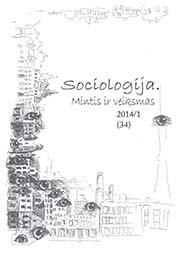Kultūrinė kritinės kriminologijos transformacija
Cultural Transformations of Critical Criminology
Author(s): Maryja ŠupaSubject(s): Social Sciences
Published by: Vilniaus Universiteto Leidykla
Keywords: Critical criminology; cultural criminology; criminological methods; transgression; edgework; resistance
Summary/Abstract: This article discusses aspects of cultural criminology that are a continuation of the critical tradition on one hand and aspects that constitute qualitatively new insights on the other. Cultural criminology emerged in the 1990s as a branch of criminology building on the heritage of critical criminology and adapting it to changing social and political conditions. In attempting to respond to the analytical and ideological crisis in critical criminology, cultural criminologists have adapted new concepts (such as transgression and edgework), found new methods for researching liquid and complex phenomena, and engaged in activism to counter processes of othering in the public sphere. Cultural criminology focuses on several major problems: the tensions of late modernity in interactions between individuals and groups negotiating norms by and in upholding or breaking them; the presentation and reification of crime in the media; the spatial analysis of power relations. The article argues that the main focus of the field is understanding (Verstehen), based on the principle of sensitive criminological understanding, and enabling a discussion of multiple normativity and a praxis–oriented application of knowledge.
Journal: Sociologija. Mintis ir Veiksmas
- Issue Year: 2014
- Issue No: 01
- Page Range: 146-167
- Page Count: 22
- Language: Lithuanian

